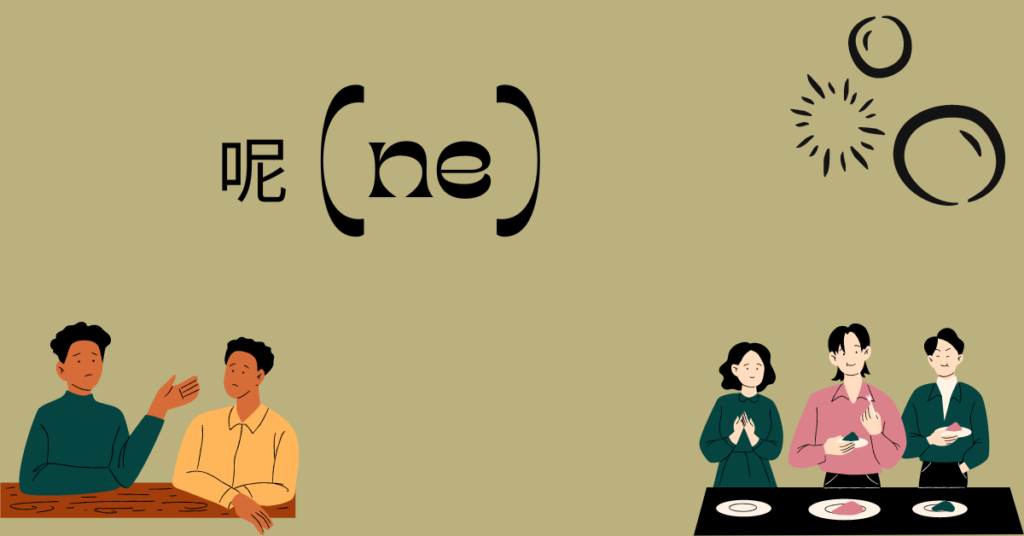
Here’s a detailed explanation of the common Chinese grammar pattern 呢 (ne) particle, along with examples:
呢 (ne) particle:
Usage: The 呢 (ne) particle is a versatile particle used in Chinese to form various grammatical patterns and ask different types of questions. It can be used to seek information, inquire about someone’s actions, ask for suggestions, and more.
- Example 1: 你在做什么呢? (Nǐ zài zuò shénme ne?) – “What are you doing?”
- Example 2: 你觉得怎么样呢? (Nǐ juéde zěnme yàng ne?) – “What do you think?”
The 呢 (ne) particle is often placed at the end of a sentence to indicate an ongoing or incomplete action or to prompt for a response or continuation.
This particle has multiple uses in Chinese grammar. Here are a few more examples:
- 现在几点钟呢? (Xiànzài jǐ diǎn zhōng ne?) – “What time is it now?”
- 你怎么这么晚才来呢? (Nǐ zěnme zhème wǎn cái lái ne?) – “Why did you come so late?”
- 你喜欢吃什么呢? (Nǐ xǐhuān chī shénme ne?) – “What do you like to eat?”
By using the 呢 (ne) particle, you can form questions, seek information, prompt for responses, and express ongoing actions or incomplete situations in Chinese. It adds a versatile and interactive aspect to conversations and inquiries.
Dialogue
Person A: 你最近在学什么?(Nǐ zuìjìn zài xué shénme?) – What have you been studying recently?
Person B: 我最近在学中文呢。(Wǒ zuìjìn zài xué zhōngwén ne.) – Recently, I’ve been studying Chinese.
Person A: 真的吗?你觉得学中文难吗?(Zhēn de ma? Nǐ juéde xué zhōngwén nán ma?) – Really? Do you find learning Chinese difficult?
Person B: 有一些挑战,但是我觉得很有趣呢。(Yǒu yīxiē tiǎozhàn, dànshì wǒ juéde hěn yǒuqù ne.) – There are some challenges, but I find it very interesting.
Person A: 那太好了,你进步肯定很快呢!(Nà tài hǎole, nǐ jìnbù kěndìng hěn kuài ne!) – That’s great! You will definitely make progress quickly!
Person B: 谢谢你的鼓励,我会继续努力的。(Xièxiè nǐ de gǔlì, wǒ huì jìxù nǔlì de.) – Thank you for your encouragement, I will continue to work hard.
Explanation
In this dialogue, Person A asks Person B what they have been studying recently with the phrase “你最近在学什么.” Person B responds by saying they have been studying Chinese with the phrase “我最近在学中文呢.”
Person A expresses surprise and asks if learning Chinese is difficult with the phrase “你觉得学中文难吗.” Person B acknowledges that there are some challenges but finds it interesting with the phrase “有一些挑战,但是我觉得很有趣呢.”
Person A expresses positive encouragement and believes that Person B will make progress quickly with the phrase “你进步肯定很快呢.” Person B thanks Person A for the encouragement and expresses their determination to continue working hard with the phrase “谢谢你的鼓励,我会继续努力的.”
Exercise
- Create your own sentence(s) using 呢 (ne)